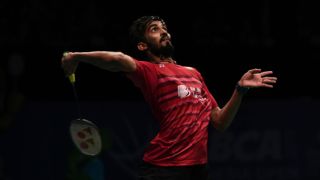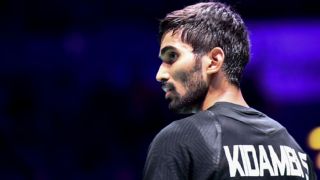A couple of weeks ago, Kidambi Srikanth posted a short video on his Instagram. It showed the 27-year-old practicing shots at the Gopichand Academy -- training having resumed there after a six-month pandemic-enforced break. The video was 15 seconds of him going through a range of strokes, concluding with a slow motion shot of him propelling himself off the court on his right foot, extending his racquet as he would a whip, before cracking it and sending the shuttle screeching past the net.
Srikanth's 400 km/h smash. It's back.
Sure, it was in training, but the latest iteration of the shot by the former world no.1 is significant. "It's the first time in nearly one and a half years that I'm able to play that stroke without really thinking about how it would affect my knee. When I'm moving on court, I'm not thinking about my knee. That's giving me a lot more freedom to play. I can do every movement that I want. I can play as fast as I want," he says.
Srikanth is referring to the niggle in his right knee that has plagued him persistently since summer last year -- an injury that has coincided with a sustained slide in his performance. From having topped the world rankings in April 2018 and being touted as a strong medal prospect at the Tokyo Olympics, Srikanth has looked uncertain of even qualifying for the Games.
He had a dismal 4 Wins-6 Losses run in 2020 and was 22nd in the race-to-Tokyo rankings (he had to be in the top 16 to be certain of a place) when the international calendar was suspended in mid-March. The troublesome knee lay at the heart of the slide.
Srikanth's game is built around speed and quick approaches to the net and he readily admits his injury drastically affected his performances. "I lost the whole of 2019 and 2020. It was a little disappointing but that's how it is and you can't really do anything about it," he says. His dismal start to the year saw him make first round exits in three BWF Tournaments - Malaysia, Indonesia and the Thailand Masters.
The fact that he was chasing an Olympic berth meant that Srikanth had to keep playing, despite being in less than optimal physical condition. "Because of the qualification race, I didn't give my body too much time to recover from my injury. I've just been trying to push myself through it," he says.
That changed with the pandemic.

Over the past six months, Srikanth has been able to get the treatment his body needed. "During the lockdown, it was more about giving my body time to recover. Considering the kind of game I play, my upper body has to be very strong; my shoulders have to be strong. I had to work on my knee and I tried to work on my shoulder. At the same time, it wasn't about pushing myself at all. I just worked for about 45 minutes to 1 hour every day. In this time, I was able to work on my knee, strengthen that particular muscle and everything around it. I was able to do proper rehab, able to prepare myself to play at the highest level once again," he says.
He will get a chance to do just that very soon. Next month, Srikanth will travel to Odense to participate in the Denmark Open, the first tournament on the BWF World Tour since the All England Open in March. "I'm really looking forward to playing that tournament. It's been six months since my last competition and I've never had that long a gap between tournaments," he says.
The competition will be particularly important, he says, to judge the level at which he's playing. "I've been training for last 6-7 weeks at the Gopichand Academy. I'm very happy with the way I'm moving on court. It's a big relief that after two years, I can play as I want and train at the level I want to. But, however much you train, it's very different when you actually play a tournament. No matter how much you train, you only understand where you are by playing tournaments."
Playing under match conditions will test him far more sternly than any level of training. "Regardless of the level to which you have prepared, you end up playing 10 percent extra [in competition]. If you are at 19-all in a training scenario, you might push yourself to what you think is all your ability, but in a match, you find an extra amount of energy you didn't think you had. Playing a tournament tells you exactly how good you are. It tells you how you can cope under match pressure and how your fitness and strength performs under difficult conditions. It will also help you understand what you need to do in the next training session. If you play with other countries," he says.

The tournament doesn't count towards his Olympic journey by way of ranking points, but that does little to diminish its importance for Srikanth. "The moment you are playing a tournament, not a single part of you that wants to lose. You are always devoted 100 percent to a victory. Tournaments are tournaments. I'm not going to Denmark thinking the points don't count so I can lose. Whether they count or not, I still want to win," he says.
While his path to Tokyo is unlikely to get any easier, Srikanth is confident now that his body is physically in the place he needs it to be. "I was already very strong mentally. That's how I was able to push myself with all that I was going through. But now I am free, since I don't have anything that is restricting my movements or game style. Now I'm just free and happy with the way I'm moving. Mentally I was very conscious about everything. In March, I was very conscious about how I was moving on court. I was always wondering whether my knee would be able to take the strain or not, whether I can make a movement or not. Now, I don't even think about it," he says.
Srikanth does, however, hope to use the tournament in Denmark, and the BWF World Tour events that follow in Asia in November, as a stepping-stone for the Olympics themselves. While the BWF has still not detailed how world ranking would be unfrozen (they had been locked, along with competition, in March), Srikanth hopes to regain some of his lost momentum in time for when they are. "I'm just focused on the next few tournaments. If I do well I think I'll be able to carry that form to help me make the Olympics. But right now it's simply about playing some tournaments and doing well."

